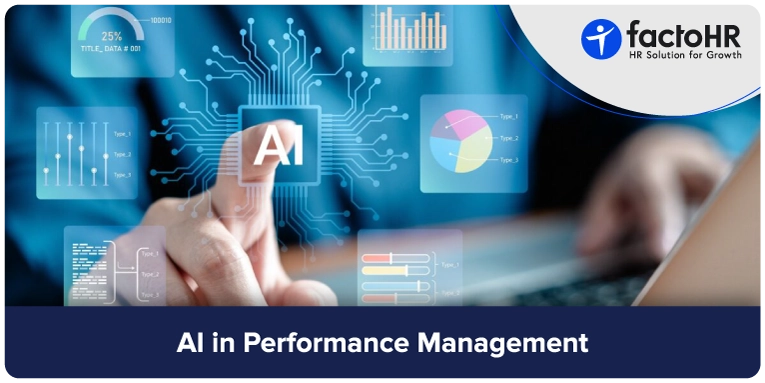The Role of Generative AI in Performance Management

Table of Contents
Evaluating employee performance is one of the most challenging aspects of modern workspaces. Especially when workforces are in a hybrid setup, you need advanced tools to measure, record, and evaluate employee performance. Fortunately, the usage of AI in performance management and tracking has gained traction.
So, how do you use AI in performance evaluations ?
The advent of AI has transformed business operations across domains, but it has been nothing short of a blessing for human resource management. Human resource managers can use custom AI algorithms to track and evaluate employee performance and optimize it through intelligent AI recommendations. In this article, you will learn how to use AI for performance management and its key benefits.
AI Tools and Applications in Performance Management
Thanks to AI tools and applications, organizations can enhance key evaluation activities like goal-setting, performance reviews, and predictive analytics. AI’s impact on performance management is growingly clear-cut.
These technologies simplify management procedures, improving accuracy, lowering administrative work, and streamlining the process.
1. Automated Performance Reviews
AI in performance management can help you automate the review process through performance data analysis, summaries, and early feedback generation. Automation allows managers to devote more time to coaching and developing their team members than administrative chores. Especially AI in PMS tools, which factoHR offers, can help you improve evaluation efficacy and productivity.
So, what’s on the offer from a tool like this?
factoHR’s performance management software provides,
- Performance measurement through custom templates that you can distribute among employees as per the roles defined.
- Efficient tracking of larger goals through a web of sub-goals and mini-goals, which you can define on the platform
- The flexibility of setting observable and measurable competencies based on different parameters like employee behaviors.
- Set custom performance measurement parameters based on weights, numbers, ratings, etc.
- Configure the review cycle with factoHR’s performance management software for a specific period.
- Allows you to set approval hierarchy, types of incentives, and employees on review during the cycle.
- Enables aggregation of feedback from multiple sources, including both internal and external stakeholders
- Offers a continuous feedback loop for employees to improve their performance.
Leveraging tools like factoHR’s performance management software, you can improve performance evaluation automation and reduce the time needed for such activities.
2. AI-Driven Goal Setting and Tracking
Crucially for performance management, AI technologies help managers create SMART (Specific, Measurable, Achievable, Relevant, Time-bound) goals. By considering position demands and historical performance, artificial intelligence may examine past data to provide each employee with reasonable targets.
Once goals have been established, artificial intelligence systems track development in real time and alert supervisors should a person lag. This proactive approach guarantees quick interventions to help staff members remain on track to fulfill their goals. It also encourages responsibility and openness in progress monitoring and assessment.
3. Predictive Analytics for Talent Management
Predictive analytics in AI-powered performance management systems help spot worker performance trends and project future results. AI, for instance, may predict which staff members will be successful in leadership roles and which will need more help to realize their full potential.
Predictive analytics also enable succession planning and aid in identifying staff skill shortages. Through pattern observation over time, artificial intelligence systems help managers create strategic plans for people management to ensure that the company is ready for any future demand.

Benefits of Using AI for Performance Management
Companies are increasingly using artificial intelligence for performance management. The reason is simple: It offers various advantages beyond conventional models. These technologies enable companies to make better judgments, boost general performance, and raise employee involvement.
Using artificial intelligence in performance management offers the following advantages:
1. Data-Driven Decision Making
AI technologies help companies use data to affect their decisions on performance management. Performance factors like staff engagement, goal attainment, and production may be processed and examined using artificial intelligence.
Deeper insights into employee performance allow human resource managers to make data-driven decisions instead of depending on subjective assessments. One key benefit of AI-driven performance management is reduced human judgment, producing a more objective assessment system.
Using AI-based performance management software, you can mix data from several systems and paint a complete picture of an employee’s contributions. This includes data from customer feedback, project management tools, and communication tools. It allows for a more focused performance improvement and increases evaluation accuracy.
2. Real-Time Feedback and Continuous Monitoring
Conventional performance reviews are usually presented once a year and provide outdated or meaningless feedback. Fast feedback from AI-powered performance management solutions lets managers spot problems early on and fix them. Constant monitoring of staff performance helps enable quick corrective action and timely recognition of accomplishments.
AI systems use daily activity data to offer real-time performance-based feedback. This guarantees that staff members may fix their performance before it negatively influences the review. Moreover, constant feedback helps managers create a more dynamic workplace.
3. Personalized Employee Development Plans
AI in performance management helps design customized growth plans considering skills, shortcomings, and professional objectives. By assessing past performance data and identifying areas for development, AI algorithms can provide particular learning modules, courses, or mentorship possibilities that match an employee’s career aspirations.
This customized approach helps employees grow by offering the correct assistance at the proper moment. AI-based performance management systems(PMS) can suggest resources or training courses for struggling employees in a particular field or offer leadership development programs to top achievers. The workforce considerably values this focused support, which raises output and satisfaction.
4. Enhanced Employee Engagement and Retention
Using AI in PMS can improve employee engagement. An engaged workforce lowers employee turnover, as employees are more inclined to stay with their company. Data-driven insights and real-time feedback from artificial intelligence help employees realize how their efforts directly affect the business’s general performance.
But why is this important?
Gartner HR research shows that only 31% of employees feel engaged and will likely stay with the organization. This is a stark reminder of a simple rule in human resource management: an engaged workforce means a loyal workforce. AI systems can help by quickly recognizing employees’ achievements and improving engagement and morale.
This never-ending development and feedback cycle produces an environment where staff members feel appreciated and driven to advance their professions.

Challenges and Limitations of AI in Performance Management
Despite its obvious advantages, artificial intelligence has several drawbacks in performance management. Knowing these limitations helps companies lower risks and maximize the benefits of artificial intelligence technologies.
1. Privacy And Data Security Issues
The running of artificial intelligence systems depends on vast volumes of data and susceptible and private information. This creates privacy and data security issues and challenges with employee information. Businesses risk employee data exploitation or breaches if artificial intelligence technologies are insufficiently guarded.
Strong data privacy policies are necessary for companies to help reduce these threats. Encryption methods and safe data storage must be applied to protect private information. Businesses should also clearly state which kinds of data are fit and unacceptable for feeding into artificial intelligence systems.
2. AI Algorithm Bias
Though its goal is to lower human prejudice, artificial intelligence is not perfectly free from bias. Past judgments or actions might sway AI systems as they are taught on historical data. Poor management of artificial intelligence systems can magnify or reinforce these prejudices, producing biased performance reviews.
Companies must routinely assess their AI systems for bias and fix them to overcome this problem. Including different teams in developing and implementing artificial intelligence models can also help guarantee their inclusiveness and equality.
3. Training And Adoption Obstacles
If artificial intelligence is included in performance management, present approaches must be changed significantly; some managers or staff members might object to the change. Moreover, the technology may be complex and requires appropriate instruction to guarantee its helpful implementation.
Businesses should fund significant training initiatives to enable staff members to apply artificial intelligence technologies successfully. This includes teaching managers to apply artificial intelligence results to their decision-making procedures. Precise knowledge of the advantages of artificial intelligence helps reduce concerns and promote more acceptance.

Future of AI in Performance Management
Artificial intelligence has a bright future as fresh advancements should expand its capacity. AI will offer more fair, data-driven, tailored performance management methods.
Predictive Talent Management
One area of much-needed research is predictive talent management using artificial intelligence. As AI develops, it will provide more comprehensive workforce planning data, enabling companies to project talent needs and design more accurate staff development plans.
AI-based Employee Training
Another trend is the growing application of coaching instruments with artificial intelligence features. These technologies will give employees tools to improve performance, feedback, and helpful training. AI will develop to enable more customized learning opportunities based on the demands of any particular worker.
Customized PMS
Artificial intelligence will increase employee engagement by utilizing highly customized performance development programs and frequent feedback loops. AI in PMS will significantly define their future route as performance management systems become more user-friendly and easy to use.
Ethical AI Considerations
At last, ethical issues regarding the application of artificial intelligence in performance management will remain of great importance. Companies will have to consider the pros and cons of AI in PMS in terms of equality, openness, and employee privacy. By handling these issues, artificial intelligence will keep changing how companies handle performance.
Conclusion
AI in performance management redefines employee evaluation with predictive analytics, real-time feedback, and customized growth plans. However, organizations must consider the pros and cons of AI in PMS. The challenges of using AI in performance management, such as algorithmic bias, data protection, and adoption, need consideration.
AI can completely change performance management with proper protection and ongoing innovation. However, improving performance management’s effectiveness, objectivity, and employee focus requires effective performance management software, and this is where factoHR can help. Schedule a Demo to learn more about the PMS solution.

Frequently Asked Questions
1. How Does AI Improve Performance Management?
Through data analytics and machine learning to evaluate employee performance in real time, artificial intelligence in performance management improves the assessment process. It provides insights for enhanced decision-making, helps automate feedback, and lessens biases. AI tools produce customized feedback, examine performance patterns, and offer a more objective assessment mechanism.
2. In What Ways AI Lower Employee Assessment Bias?
By stressing data-driven insights, artificial intelligence reduces common biases, including personal preference and recency bias. Based on objective criteria, it assesses employee performance, therefore lessening the influence of personal ties or current events. This advances performance review fairness.
3. Can AI Give Employees Real-Time Feedback?
Indeed, artificial intelligence helps executives to provide real-time comments grounded on current performance data. This enables quick intervention when performance problems develop and instant appreciation of successes. This change from yearly assessments to constant feedback promotes engagement and continuous progress.
4. How AI Can Negatively Impact Performance Management?
Although artificial intelligence presents numerous advantages, it also has drawbacks, including privacy issues, data interpretation errors, and the chance of amplifying existing prejudices should the AI algorithms be poorly trained.
Grow your business with factoHR today
Focus on the significant decision-making tasks, transfer all your common repetitive HR tasks to factoHR and see the things falling into their place.

© 2026 Copyright factoHR


